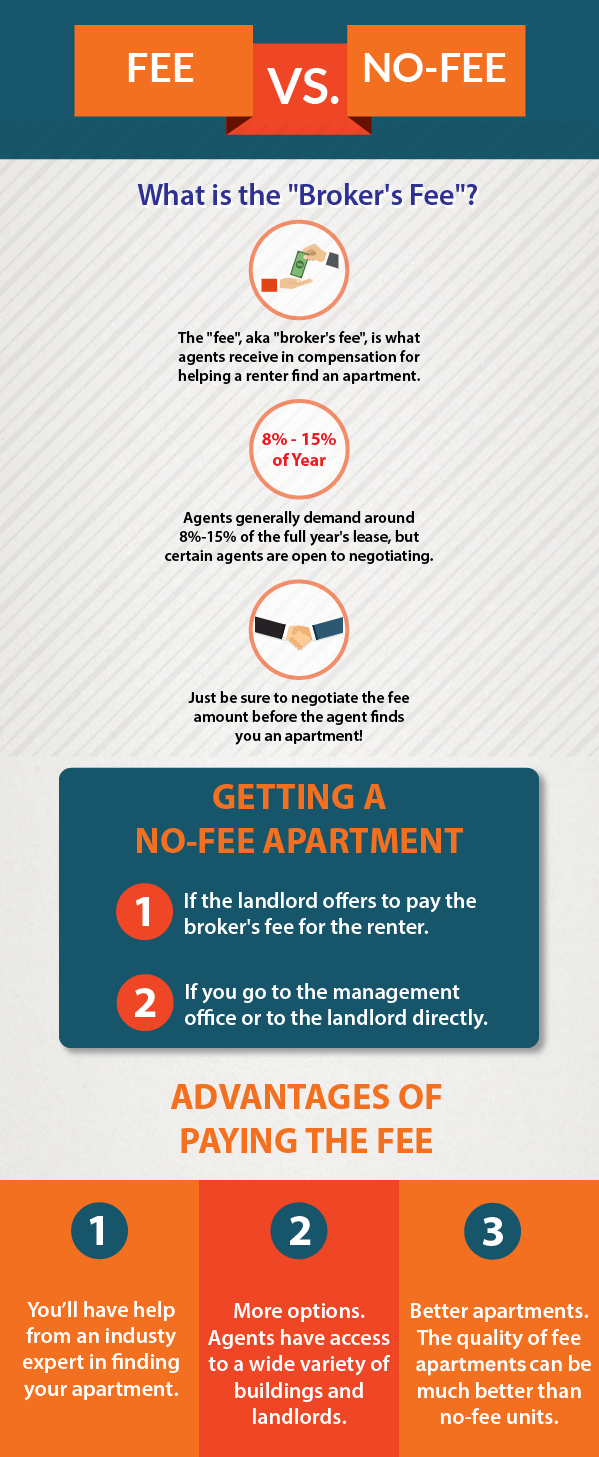When you work with an agent, you may pay a broker’s fee in addition to the first month’s rent and security deposit. Most agents work solely off commission; their broker fee is their source of income. The broker’s fee is the agent’s money for their services, including showing the apartment and then handling and guiding renters through the application process. Most New York City agents charge between one month’s rent and 15% of the annual rent for the broker’s fee.
When working with an agent who charges a broker’s fee, the agent will ask you to sign two forms before showing an apartment:
- Fee Agreement: This form protects an agent and ensures payment (either from the renter or the landlord) if you successfully sign the lease.
- Agency’s Disclosure Form: This document clarifies who the agent represents, either the landlord or the renter.
Neither form binds you to lease the apartment. You can sign the form and then decide you don’t want to apply for that unit. The documents designate that the agent will receive their commission if you do rent that apartment. You can ask for a copy of the agreements to keep for your records. Many agents now send these forms electronically before a showing, so you will receive the executed digital copy in your email.
If you do not want to pay a broker’s fee while working with an agent, you have several options, including searching for no-fee listings.
What is a “no-fee” listing?
A no-fee apartment is typically a unit where the renter doesn’t pay a broker’s fee. You can search for no-fee listings on RentHop, so you do not have to pay a broker’s fee. In this scenario, the landlord or management company pays the broker’s fee to the agent directly, which is how the agent makes their income if a you sign a lease. When you acquire the apartment, you will only pay the first month’s rent and the security deposit.
Listings put online by the owner of a building do not have a broker’s fee, as there will not be an agent involved in the process. Therefore, you can also use the “by owner” filter to find listings where you do not have to pay a broker’s fee.
How to negotiate a listing with a fee
When a listing does not say “No-Fee,” the agent most likely charges a broker’s fee. Before meeting with the agent or signing any disclosure forms, you should ask about the fee. Most times, an agent will mention if there is a fee before bringing you to an appointment, as they also do not want to waste their or your own time and energy.
You may be able to negotiate the amount of the broker’s fee. While it is unlikely that an agent charging a fee will agree to get rid of the fee altogether, there may still be flexibility in terms of the amount. An agent charging a 15% broker’s fee may negotiate down to 12%, 8%, or one month’s rent. You can follow these tips to try and negotiate:
- Prove that you’re an informed renter. Continue reading through the rest of this guide to learn about the entire rental process. If you can prove that you know your roles and that you’re knowledgeable and prepared, an agent may be more motivated to lower their fee.
- Prepare all paperwork ahead of time. An agent is more inclidned to work with a renter when they know that renter can submit an apartment right when they see it. If you can submit an application right after viewing a unit you like, you increase the odds of getting accepted and signing a lease, meaning the agent increases their chances of closing the deal and earning their commission. You can use your level of preparedness as a negotiating tactic to argue that you will save the agent time and effort during the application process and make them quick and easy money.
- You can work with as many agents as they would like. However, if you signed multiple agency disclosure forms for the same apartment with different agents, you may have to pay each agent’s broker’s fee. For example, if Agent A shows you an apartment and you sign their disclosure forms, then decide to view that same apartment a week later with Agent B and sign their disclosure forms, you will have to pay the broker’s fee to the agents A and B if they rent the apartment. This occasion is rare, but you should still be mindful of who you view each apartment with.
- Sometimes it’s good to try out multiple agents. If you feel uncomfortable with an agent for any reason, reach out to another agent at their brokerage to find someone who you communicate well with.
- If you plan to use the help of multiple agents, let those agents know. This will open lines of communication, and you can tell an agent if you’ve already seen a unit or ones in the area that you did not like, helping each agent find more properties that you want to view.

Difference between no-fee vs. fee listings
If you’re looking for apartments, you may come across both listings with a fee and listings without a fee. While one may seem more advantageous than the other, the main difference between a fee versus a no-fee listing is the timeline in which a renter pays the broker’s fee.
A “no-fee” listing means the tenant will secure the apartment with their first month of rent, a security deposit, and an application fee. A broker’s fee listing will include all of those payments in addition to a broker’s fee. Renters can immediately save money when looking for a no-fee apartment and avoid paying an additional lump sum at the lease signing.
However, tenants eventually end up paying the broker fee over the course of their lease. Landlords who advertise a “no-fee” apartment will pay the broker’s fee themselves but bake that cost into the overall rental price of the unit. Tenants will likely pay more in rent each month than they would if they rented the same unit with a broker’s fee. Units with a broker’s fee may have a lower rental price as landlords will consider that their tenant pays a larger amount when securing the apartment.
Therefore, a renter’s decision on whether to pay the broker’s fee or seek a no-fee listing can come down to their financial timeline. A renter who acquired a lump sum of cash from a bonus, gift, etc., may rent a unit with a broker’s fee to take advantage of a lower rent for the duration of their lease. Another renter with consistent income may find a no-fee listing to lower the initial cost of signing for the apartment, knowing that they can afford their monthly rental payment.
Additional discounts and concessions
While you may end up paying a broker’s fee, there are other opportunities available for saving money. Sometimes, landlords looking to quickly rent a unit may offer a rental concession, where they decrease the amount of money a renter pays over the duration of their lease term. A concession may include a month or two of free rent on a twelve or twenty-four month lease. It is also important to note that some landlords may offer concessions, but in turn increase the monthly rental price, negating the deal and simply using the move as an appealing marketing tactic.
How many agents should I work with?
If you decide to work with an agent, you may contact several agents about various apartments. Some agents may only work with a few listings; therefore, you may need to work with multiple agents to cover all the apartments that you are interested in viewing. It’s possible that you may find an agent who can show them a wide variety of listings. Everyone has their own experience, and some may successfully rent the first apartment they look at with one agent, while others may meet with several agents before signing a lease.
No matter what you decide to do, you should be aware of the following:









